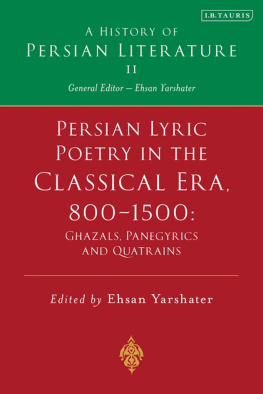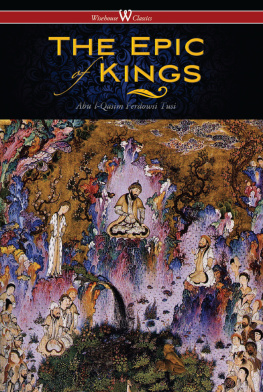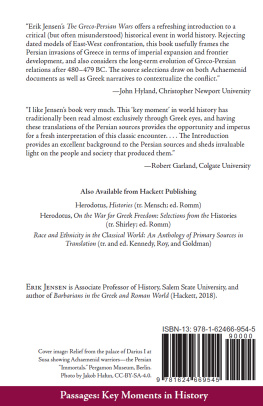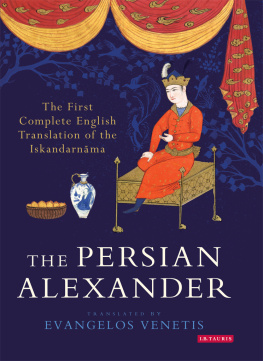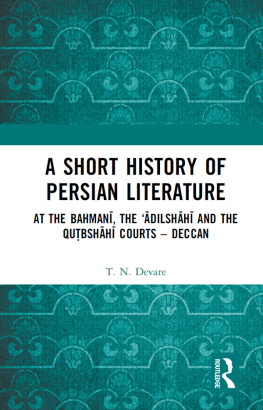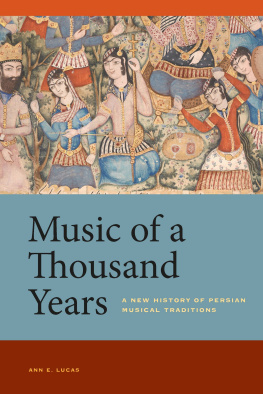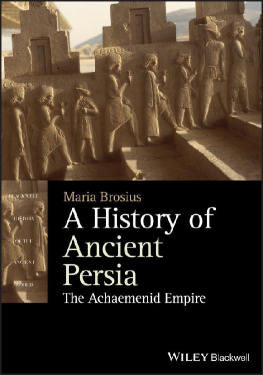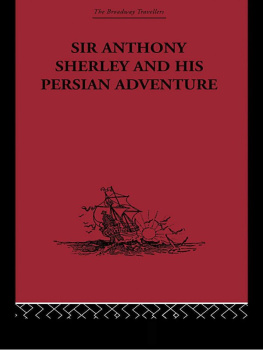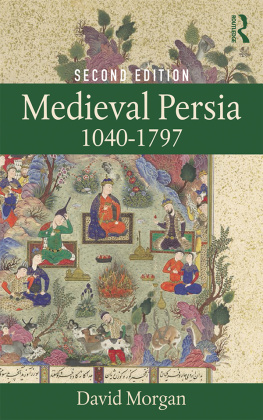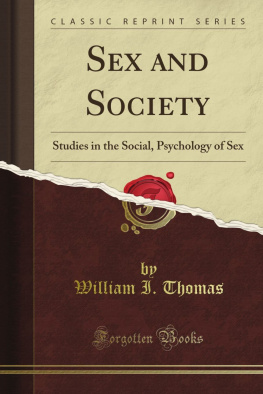E.G. Browne - A Literary History of Persia
Here you can read online E.G. Browne - A Literary History of Persia full text of the book (entire story) in english for free. Download pdf and epub, get meaning, cover and reviews about this ebook. year: 1906, 2008, publisher: Routledge, genre: Science. Description of the work, (preface) as well as reviews are available. Best literature library LitArk.com created for fans of good reading and offers a wide selection of genres:
Romance novel
Science fiction
Adventure
Detective
Science
History
Home and family
Prose
Art
Politics
Computer
Non-fiction
Religion
Business
Children
Humor
Choose a favorite category and find really read worthwhile books. Enjoy immersion in the world of imagination, feel the emotions of the characters or learn something new for yourself, make an fascinating discovery.

A Literary History of Persia: summary, description and annotation
We offer to read an annotation, description, summary or preface (depends on what the author of the book "A Literary History of Persia" wrote himself). If you haven't found the necessary information about the book — write in the comments, we will try to find it.
A Literary History of Persia — read online for free the complete book (whole text) full work
Below is the text of the book, divided by pages. System saving the place of the last page read, allows you to conveniently read the book "A Literary History of Persia" online for free, without having to search again every time where you left off. Put a bookmark, and you can go to the page where you finished reading at any time.
Font size:
Interval:
Bookmark:
The Library
of
Literary History

1. A LITERARY HISTORY OF INDIA. By R. W. FRAZER, LL.B.
2. A LITERARY HISTORY OF IRELAND. By DOUGLAS HYDE, LL.D.
3. A LITERARY HISTORY OF AMERICA. By BARRETT WENDELL.
4. A LITERARY HISTORY OF PERSIA. From the Earliest Times until Firdawsi. By EDWARD G. BROWNE, M.A.
5. A LITERARY HISTORY OF SCOTLAND. By J. H. MILLAR, LL.B.
6. A LITERARY HISTORY OF PERSIA. From Firdawsi until Sadi. By EDWARD G. BROWNE, M.A.
7. A LITERARY HISTORY OF FRANCE. By EMILE FAGUET.
8. A LITERARY HISTORY OF THE ARABS. By REYNOLD A. NICHOLSON, M.A.
9. A LITERARY HISTORY OF RUSSIA. By A. BRCKNER.
10. A LITERARY HISTORY OF ROME. By J. WIGHT DUFF, M.A., D. Litt.
THE LIBRARY
OF
LITERARY HISTORY
From Firdaws to Sad

A PERSIAN POET OF THE LATE THIRTEENTH CENTURY PRESENTING
A QUASDA OR PANEGYRIC TO A MONGOL PRINCE OR GOVERNOR.
This miniature is from a Persian Manuscript containing selected poems from the Diwans of Six Persian poets. The manuscript was transcribed in A.H. 714 (= A.D. 1315). formerly belonged to Shh Ismal the Safaw, and is now in the India Office Library (No. 132 = No. 903 of Eths Catalogue). As the artist himself lived in the Mongol Period, the details of costume may be regarded as authoritative while the difference of physiognomy between the Persian and the six Mongols is clearly apparent.

First published in 1906
by T. Fisher Unwin, Ltd
This edition published by Routledge
2 Park Square, Milton Park,
Abingdon, Oxon, OX14 4RN
1999 Routledge
Routledge is an imprint of the Taylor & Francis Group
Transferred to Digital Printing 2008
All rights reserved. No part of this book may be reprinted or reproduced or utilised in any form or by any electronic, mechanical, or other means, now known or hereafter invented, including photocopying and recording, or in any information storage or retrieval system, without permission in writing from the publishers.
British Library Cataloguing in Publication Data
A catalogue record for this book is available from the British Library
ISBN 0 7007 0406 X (set)
ISBN 0 415 46947 3 (hbk)
eISBN 978-1-13456-842-0
Publishers Note
The publisher has gone to great lengths to ensure the quality of this reprint but points out that some imperfections in the original may be apparent
ALTHOUGH this book of mine is all unmeet,
Light of mine eyes, to lay at thy dear feet,
I think that Alchemy which worketh still
Can turn to gold this copper, if it will,
Enlarge its merits and ignore its ill.
Can I forget how, as it neared its end,
A happy chance permitted me to blend
Rare intervals of worship ill-concealed,
Occasions brief of love but half revealed,
Long days of hope deferred, short hours of bliss,
Into a happiness so full as this?
Now come I, Dearest, for my book to claim
Even so great an honour as thy name!
THE present volume is a continuation of that which I published in the same series four years ago, and carries the Literary History of Persia on from the beginning of the eleventh to the middle of the thirteenth century of our era. This period, comparatively short as it is, includes most of the greatest poets and writers of the Persians, and I hardly anticipate that I shall be accused by any competent critic of discussing it with undue detail. Should I succeed in carrying out my original plan, by continuing the history down to our own times, I believe that the remaining six centuries and a half can be adequately treated in one volume equal in size to this.
Of the defects of this book, now that it is all in type, I am fully sensible. They arise largely from the fact that it was chiefly written during vacations, and that two months or more often elapsed between the completion of one chapter and the beginning of the next. Under present conditions the University of Cambridge is far from being the best place in the world for quiet, steady, regular work; and though the books of reference indispensable for a compilation of this kind were there, leisure was only to be found elsewhere, even as the poet ib says:
Shigfa b thamar hargiz na-gardad jamdar yak j:
Mul-ast nki b-ham nimat u dindn shavad payd!
Never in one place are found the luscious fruit and blossom fine;
Vain it is for one to hope both teeth and dainties to combine!
In consequence of this, the book, as I am well aware, is marred not only by occasional repetitions, but by a certain disconnectedness and lack of uniformity for which I crave the readers indulgence. On the other hand I have throughout endeavoured to use original sources and to form independent views, and in this I have been aided by several rare works, inaccessible or hardly accessible to my predecessors, of which I may specially mention the Chahr Maqla (Four Discourses) of Ni dh m-i-Ar of Samarqand, the Lubbul-Albb of Muammad Awf, the Muajjam of Shams-i-Qays, and my notes on the Ratu-udr of ar-Rwand, the Jahn-gush of A Malik-i-Juwayn, the Jmiut-Tawrkh of Rashdud-Dn Fadlullh, and other similar books.
The work itself has had my whole heart, and I would that it could also have had my undivided attention. For Islm and the Perso-Arabian civilisation of Islm I have the deepest admiration; an admiration which it is especially incumbent on me to confess at a time when these are so much misunderstood and misrepresented by Europeans; who appear to imagine that they themselves have a monopoly of civilisation, and a kind of divine mandate to impose on the whole world not only their own political institutions but their own modes of thought. Year by year, almost, the number of independent Muslim States grows less and less, while such as still remainPersia, Turkey, Arabia, Morocco, and a few othersare ever more and more overshadowed by the menace of European interference. Of course it is in part their own fault, and Asiatic indifference and apathy combine with European earth-hunger and lust of conquest to hasten their disintegration. To the unreflecting Western mind the extinction of these States causes no regret, but only exhilarating thoughts of more openings for their children and their capital; but those few who know and love the East and its peoples, and realise how deeply we are indebted to it for most of the great spiritual ideas which give meaning and value to life, will feel, with Chestertons Man in Green, that with the subsidence of every such State something is lost to the world which can never be replaced. Yet this is not, perhaps, a question which can be settled by argument, any more than it can be settled by argument which is better, a garden planted with one useful vegetable or with a variety of beautiful flowers, each possessing its own distinctive colour and fragrance. But this at least must be admitted by any one who has a real sympathy with and understanding of the Spirit of the East, that it suffers atrophy and finally death under even a good and well-meaning European administration; and that for this reason Constantinople, Damascus, Shrz and Fez, for all their shortcomings, do possess something of artistic and intellectual, even, perhaps, of moral value, which Cairo, Delhi, Algiers, and Tunis are losing or have lost. Whether Islm is still bleeding to death from the wounds first inflicted on it by the Mongols six hundred and fifty years ago, or whether the proof given by Japan that the Asiatic is not, even on the physical plane, necessarily inferior to the European may lead to some unexpected revival, is a question of supreme interest which cannot here be discussed.
Next pageFont size:
Interval:
Bookmark:
Similar books «A Literary History of Persia»
Look at similar books to A Literary History of Persia. We have selected literature similar in name and meaning in the hope of providing readers with more options to find new, interesting, not yet read works.
Discussion, reviews of the book A Literary History of Persia and just readers' own opinions. Leave your comments, write what you think about the work, its meaning or the main characters. Specify what exactly you liked and what you didn't like, and why you think so.

